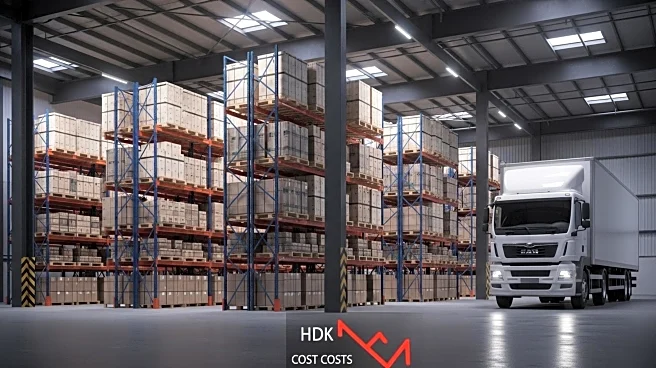What is the story about?
What's Happening?
The Logistics Managers' Index (LMI) for September indicates continued growth in the logistics sector, albeit at a slower pace. The LMI, a collaborative effort among several universities and supported by the Council of Supply Management Professionals, measures various components of the logistics industry, including inventory levels, warehousing capacity, and transportation metrics. The September reading was 57.4, down from August's 59.3, marking the lowest level since March and the second-lowest this year. This slowdown is attributed to declining growth rates in transportation utilization, prices, and capacity. Despite the decrease in transportation prices, they remain in expansion territory, though at the slowest rate since April 2024. Inventory levels and costs also saw reductions, with warehousing prices experiencing the largest drop among sub-indices.
Why It's Important?
The logistics sector's slower growth has significant implications for U.S. supply chain strategies, particularly as it coincides with the typically busy freight season. The decline in transportation and warehousing costs suggests a shift in market dynamics, potentially affecting pricing strategies and inventory management for businesses. As transportation prices and capacity continue to expand, albeit slowly, companies may need to adjust their logistics operations to maintain efficiency and cost-effectiveness. The reduced growth rate could impact holiday merchandise shipments, traditionally strong in September, influencing retail and consumer sectors.
What's Next?
The logistics industry may face further adjustments as stakeholders respond to the changing growth dynamics. Businesses might explore alternative strategies to optimize inventory and transportation costs, especially with the holiday season approaching. The ongoing trade tensions and tariff implications could further influence logistics operations, prompting companies to reassess their supply chain resilience and adaptability. Stakeholders, including logistics providers and retailers, will likely monitor these trends closely to anticipate potential disruptions and opportunities.
Beyond the Headlines
The logistics sector's performance reflects broader economic trends, including consumer demand fluctuations and international trade policies. The industry's ability to adapt to these changes will be crucial in maintaining supply chain stability. Ethical considerations, such as fair labor practices and environmental impact, may also gain prominence as companies seek sustainable growth amid economic uncertainties.















